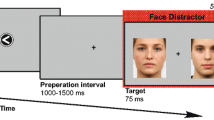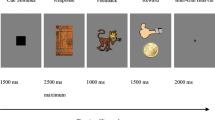Abstract
This study investigated the effect of methylphenidate (Ritalin) on the selective attention of hyperactive children designated as favorable or adverse responders to stimulant medication. Using a type II incidental learning paradigm, it was found that children in the drug condition recalled more central and less incidental stimuli than those children in the placebo condition. While no differential effects on recall were found for responder type, methylphenidate did affect the spontaneous overt labeling of central stimuli by the favorable responder group. Results were interpreted in terms of the role of methylphenidate in narrowing the focus of attention. Implications for the classification of hyperactive children as favorable and adverse responders were also discussed.
Similar content being viewed by others
References
Bahrick, H. P. Incidental learning under two incentive conditions.Journal of Experimental Psychology, 1954,47, 170–172.
Bahrick, H. P. Incidental learning at five stages of intentional learning.Journal of Experimental Psychology, 1957,54, 259–261.
Berlyne, D. E. Attention as a problem in behavior theory. In D. I. Mostofsky (Ed.),Attention: Contemporary theory and analysis. New York: Appleton-Century-Crofts, 1970.
Burns, J. T., House, R. F., Fensch, F. C., & Miller, J. G. Effects of magnesium pemoline and dextroamphetamine on human learning.Science, 1967,152, 849–851.
Campbell, S. B., Douglas, V. I., & Morgenstern, G. Cognitive styles in hyperactive children and the effect of methylphenidate.Journal of Child Psychology and Psychiatry, 1971,12, 55–67.
Cohen, N. J., Douglas, V. I., & Morgenstern, G. The effect of methylphenidate on attentive behavior and autonomic activity in hyperactive children.Psychopharmacologica, 1971,22, 282–294.
Conners, C. K. Pharmacotherapy of psychopathology in children. In H. C. Quay & J. S. Werry (Eds.),Psychopathological disorders of childhood. New York: Wiley, 1972.
Conners, C. K., & Eisenberg, L. The effects of methylphenidate on symptomatology and learning in disturbed children.American Journal of Psychiatry, 1963,120, 458–464.
Conners, C. K., Eisenberg, L., & Sharpe, L. Effect of methylphenidate (Ritalin) on pairedassociate learning and Porteus maze performance in emotionally disturbed children.Journal of Consulting Psychiatry, 1964,28, 14–22.
Dalby, J. T., Kinsbourne, J. M., Swanson, J. M., & Sobol, M. P. Hyperactive children's underuse of learning time: Correction by stimulant treatment.Child Development, 1977,48, 1448–1453.
Douglas, V. I. Stop, look and listen: The problem of sustained attention and impulse control in hyperactive and normal children.Canadian Journal of Behavioral Science, 1972,4, 259–282.
Druker, J. F., & Hagen, J. W. Developmental trends in the processing of task relevant and irrelevant information.Child Development, 1969,40, 371–382.
Dusek, J. B. The effects of labeling and pointing on the children's selective attention.Developmental Psychology, 1978,14, 115–116.
Hagen, J. W. The effect of distraction on selective attention.Child Development, 1967,38, 685–694.
Hagen, J. W. Strategies for remembering. In S. Farnham-Diggory (Ed.),Information processing in children. New York: Academic Press, 1972.
Hallahan, D. P., Kauffman, J. M., & Ball, D. W. Developmental trends in recall of central and incidental auditory material.Journal of Experimental Child Psychology, 1974,71, 409–421.
Kinsbourne, M. The mechanism of hyperactivity. In M. Blau, I. Rapin, & M. Kinsbourne (Eds.),Topics in child neurology. New York: Spectrum Press, 1977.
Knights, R. M., & Hinton, G. G. The effects of methylphenidate (Ritalin) on the motor skill and behavior of children with learning problems.Journal of Nervous and Mental Disease, 1969,148, 643–653.
Laufer, M., & Denhoff, E. Hyperkinetic behavior syndrome in children.Journal of Pediatrics, 1957,50, 463–474.
Maccoby, E. E., & Hagen, J. W. Effects of distraction upon central versus incidental recall: Developmental trends.Journal of Experimental Child Psychology, 1965,2, 280–289.
McNemar, Q.Psychological statistics (4th edition). New York: Wiley, 1969.
Meichenbaum, D.Cognitive behavior modification: An integrative approach. New York: Plenum Press, 1977.
Millichap, J. G., Aymat, T., Sturgis, L. H., Larsen, K. W., & Egan, R. A. Hyperkinetic behavior and learning disorders: III. Battery of neuropsychological tests in a controlled trial of methylphenidate.American Journal of Diseases of Childhood, 1968,116, 235–244.
Rapoport, J. L., Buchsbaum, M. S., Zahn, T. P., Weingartner, H., Ludlow, C., & Mikkelsen, E. J. Dextroamphetamine: Cognitive and behavioral effects in normal prepubertal boys.Science, 1978,199, 560–562.
Ross, D. The relationship between intentional learning, incidental learning, and type of reward in preschool, educable, mental retardates.Child Development, 1970,41, 1151–1158.
Ross, D. M., & Ross, S. A.Hyperactivity: Research, theory and action. New York: Wiley, 1976.
Safer, D. J., & Allen, R. P.Hyperactive children: Diagnosis and management. Baltimore: University Park Press, 1976.
Satterfield, J. H. Neurophysiologic studies with hyperactive children. In D. P. Cantwell (Ed.),The hyperactive child: Diagnosis, management, current research. New York: Spectrum, 1975.
Smith, G. M., Weitzner, M., Levenson, S. R., & Beecher, H. K. Effects of amphetamine and decobarbital on coding and mathematical performance.Journal of Experimental Pharmacology and Experimental Therapeutics, 1963,141, 100–104.
Smith, R. G. Magnesium pemoline: Lack of facilitation in human learning, memory and performance tests.Science, 1967,152, 603–605.
Sroufe, L. A. Drug treatment of children with behavior problems. In F. Horowitz (Ed.),Review of child development research (Vol. 4). Chicago: University of Chicago Press, 1975.
Sroufe, L. A., Sonies, B. C., West, W. D., & Wright, F. S. Anticipatory heart deceleration and reaction time in children with and without referral for learning disability.Child Development, 1973,44, 267–273.
Swanson, J. M., & Kinsbourne, M. Stimulant related state-dependent learning in hyperactive children.Science, 1976,192, 1354–1357.
Swanson, J. M., Kinsbourne, M., Roberts, W. L., & Zuker, K. A time-response analysis of the effect of stimulant medication on the learning ability of children referred for hyperactivity.Pediatrics, 1978,61, 21–29.
Sykes, D. H., Douglas, V. I., & Morgenstern, G. The effect of methylphenidate (Ritalin) on sustained attention in hyperactive children.Psychopharmacologica, 1972,25, 262–274.
Traver, S. G., Hallahan, D. P., Kauffman, J. M., & Ball, D. M. Verbal rehearsal and selective attention in children with learning disabilities: A developmental lag.Journal of Experimental Child Psychology, 1976,22, 375–385.
Weiss, B., & Laties, V. G. Enhancement of human performance by caffeine and the amphetamines.Pharmacological Review, 1962,14, 1–36.
Wender, P.Minimal brain dysfunction in children. New York: Wiley Interscience, 1971.
Wheeler, R. J., & Dusek, J. B. The effects of attentional and cognitive factors on children's incidental learning.Child Development, 1973,44, 251–258.
Author information
Authors and Affiliations
Additional information
This paper is based on a master's thesis completed by the first author in the Department of Psychology, University of Guelph, under the supervision of the second author. The authors wish to thank J. Thomas Dalby for his assistance in the conducting of this experiment.
Rights and permissions
About this article
Cite this article
Thurston, C.M., Sobol, M.P., Swanson, J. et al. Effects of methylphenidate (Ritalin) on selective attention in hyperactive children. J Abnorm Child Psychol 7, 471–481 (1979). https://doi.org/10.1007/BF00917617
Revised:
Issue Date:
DOI: https://doi.org/10.1007/BF00917617




